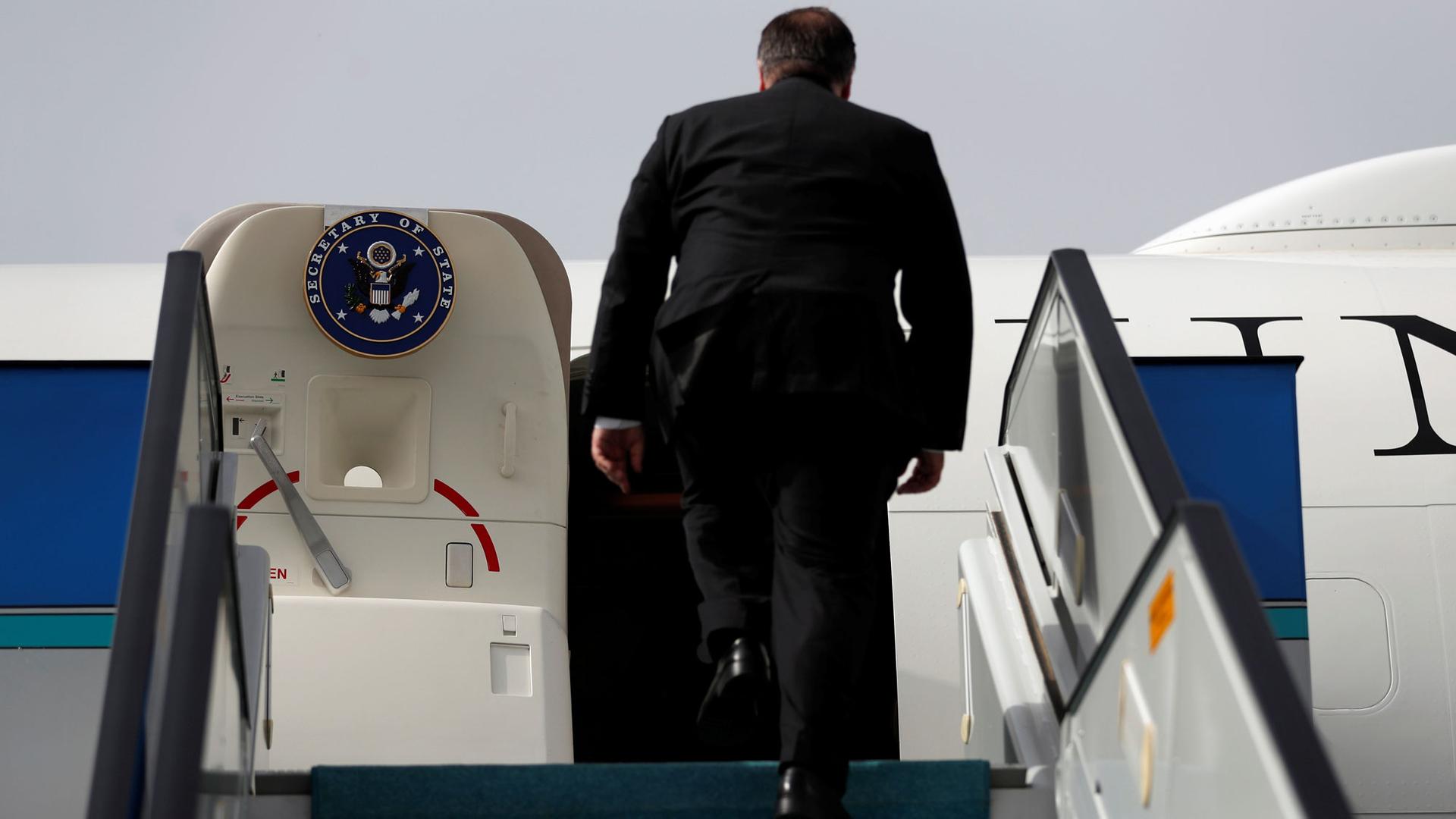Pompeo meets Erdoğan after talks with Saudis on missing journalist
US Secretary of State Mike Pompeo prepares to leave after meeting with Turkish President Tayyip Erdoğan, Ankara, Turkey, Oct. 17, 2018.
US President Donald Trump gave Saudi Arabia the benefit of the doubt on Wednesday even as US lawmakers pointed the finger at Saudi leadership over allegations Saudi journalist Jamal Khashoggi was killed at the county’s consulate in Turkey.
Secretary of State Mike Pompeo was sent by Trump to meet with Saudi King Salman and his Crown Prince in Riyadh and later Turkey’s President and Foreign Minister on Wednesday.
Turkish Foreign Minister Mevlut Cavusoglu has said Pompeo would provide information about the case after Khashoggi, a US resident, vanished during a visit to the consulate on Oct. 2 to collect marriage documents.
But he provided no details following Pompeo’s two 40-minute meetings at the airport with Cavusoglu and President Tayyip Erdoğan, describing them only as “beneficial and fruitful.” Pompeo did not address reporters.
Turkish officials have said they believe Khashoggi — a prominent critic of Saudi Crown Prince Mohammed bin Salman — was murdered and his body removed. Turkish sources have told Reuters the authorities have an audio recording indicating Khashoggi was killed inside the consulate.
The Saudis have strongly denied those allegations, but US media outlets have reported they will acknowledge he was killed in a botched interrogation. Trump has speculated without providing evidence that “rogue killers” could be responsible.
Turkish investigators searched the consulate for the first time on Monday night, gathering “strong” but inconclusive evidence that Khashoggi was killed there. Erdoğan has indicated that parts of the consulate had been repainted.
A search of the consul’s residence and vehicles was delayed after the consul returned to Riyadh on Tuesday.
“Yesterday (the Saudis) did not want the search to be done since the consul’s family was inside,” Cavusoglu said. “However, according to the information we received, we expect to get a permit today.”
Test for crown prince
How the crown prince emerges from the crisis is a test of how the West will deal with Saudi Arabia in the future. At issue will be to what extent the West believes responsibility for Khashoggi lies with the powerful young ruler.
A pro-government Turkish daily published preliminary evidence last week from investigators who it said had identified a 15-member Saudi intelligence team that arrived in Istanbul on diplomatic passports hours before Khashoggi disappeared.
A New York Times report, citing witnesses and other records, linked four suspects to Prince Mohammed’s security detail.
One name matches a LinkedIn profile for a forensic expert who has worked at the interior ministry for 20 years. Another is identified in a diplomatic directory from 2007 as a first secretary at the Saudi Embassy in London. Others resemble officers in the Saudi Army and Air Force.
After his meetings with the King and Crown Prince on Tuesday, Pompeo said Saudi Arabia has committed to conducting a full investigation.
“They indicated they understood that getting that done in a timely, rapid fashion so they could begin to answer important questions,” he told reporters traveling with him.
Asked whether they said Khashoggi was alive or dead, Pompeo said: “They didn’t talk about any of the facts.”
Earlier, Trump tweeted that Prince Mohammed had denied knowing what happened in the Saudi consulate.
“I think we have to find out what happened first,” Trump told the Associated Press in an interview on Tuesday. “Here we go again with, you know, you’re guilty until proven innocent. I don’t like that.”
Deserted conference
Prince Mohammed, who has enjoyed a close relationship with the Trump administration, has painted himself as the face of a new, vibrant Saudi Arabia, diversifying its economy away from reliance on oil and making some social changes.
But there has been mounting criticism of some of the prince’s moves, including Riyadh’s involvement in the Yemen war, the arrest of women activists, and a diplomatic row with Canada.
Members of the US Congress, including some of Trump’s fellow Republicans, are among the loudest voices in the United States demanding answers and action on Khashoggi, a Washington Post columnist who moved to Washington last year fearing retribution for his critical views.
Senator Lindsey Graham, a Republican close to Trump, has called Prince Mohammed “a wrecking ball” and accused him of ordering Khashoggi’s murder.
Despite Western concerns about Saudi Arabia’s human rights record, Trump still says he is unwilling to pull out of weapons sales agreements with Riyadh.
US Treasury Secretary Steven Mnuchin plans to attend an investment conference in Riyadh next week known as “Davos in the desert,” even as IMF Managing Director Christine Lagarde and Societe Generale CEO Frederic Oudea joined a growing list of executives who have pulled out.
The event is unrelated to the World Economic Forum’s annual meeting in Switzerland.
German Foreign Minister Heiko Maas said he was delaying a decision on whether to go through with a planned visit to Saudi Arabia intended to help repair strained relations.
Saudi Arabia, the world’s top oil exporter and a partner in US efforts to combat Iranian influence in the region, has said it would retaliate against any pressure or economic sanctions.
By Leah Millis and Tulay Karadeniz/Reuters
Additional reporting by Makini Brice and Lesley Wroughton in Washington, Ali Kucukgocmen and Gulsen Solaker in Istanbul; Writing by Daren Butler and Stephen Kalin; Editing by Jon Boyle.
We want to hear your feedback so we can keep improving our website, theworld.org. Please fill out this quick survey and let us know your thoughts (your answers will be anonymous). Thanks for your time!
